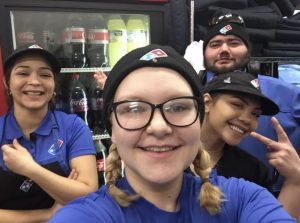
What’s a food truck supposed to do to get some business around Chicago?
Apparently, a lot. A recent Cook County court decision kept in place the city’s regulations that many consider the most restrictive in the nation, according to Gabriel Wiesen, head of the Illinois Food Truck Owners Association.
“Chicago has the strictest food truck laws in the country, that’s a fact,” said Wiesen, owner of Beavers Donuts which offers its walk-up customers confections such as Funky Monkey, a banana and Nutella donut, and Loco Coco, one that includes chocolate sauce and coconut.
But there might be some hope for food truck owners. A recent proposal introduced by Ald. Proco “Joe” Moreno (1st) would offer some flexibility to the existing ordinance that was challenged in court.
“Chicago has laws that are counterproductive to safety, and infringe on basic small business rights, and that’s really unfortunate,” said Wiesen, pointing out that food trucks owners in Chicago have a multitude of obstacles, including a two-hour parking limit for each location. Fines for disregarding food truck ordinances can range between $1,000 to $2,000, or even higher.
Moreno’s proposal, submitted December 14, would expand the two-hour parking limit to six hours, which would help food safety issues especially for trucks dealing with hot oils cookers.
“Food truck owners are trying to operate a business in Chicago and are finding it to be extremely difficult due to the overly burdensome regulations,” said Moreno in a press release. “We have to make changes to the law so these small-business owners have every opportunity to succeed… The current two-hour limit has been a financial concern as well as a safety hazard for Chicago food truck operators since it became law in 2012.”
However, food trucks would still be required to park at least 200 feet away from brick and mortar restaurants. Additionally, all food trucks “must be equipped with a global positioning system (GPS)” that the city can monitor, according to restrictions set by Chicago’s Business Affairs and Consumer Protection.
Some of those restrictions were challenged in court by LMP Services owned by Elmhurst baker Laura Pekarik, who owns the Cupcakes for Courage food truck. She lost her battle in court on December 5, when Cook County Circuit Court Judge Anna Helen Demacopoulos ruled in favor of the city’s regulations, according to Austin Berg, a writer at the Illinois Policy Institute.
A poll by Berg’s public policy group that tracks entrepreneurial issues found that nearly 60 percent of Chicagoans think the two-hour limit is unfair and support changing existing regulations to make operating a food truck in Chicago easier. Moreno cited that poll in his press release that added that 55 percent of Chicagoans would like to see more food trucks operating in Chicago
Berg said the local laws extremely limit the food truck owner’s ability to sell their food, pointing out that only “three percent of [Chicago] streets are available for food truck parking.”
Juan Macias, an employee of Mr. Quiles Mexican Food Truck, explained how difficult it can be to get a spot on the street for food trucks.
“It makes it really hard because we actually have to come really early just to get the spot, because everybody wants to take one of these spots, or else they get ticketed somewhere else,” said Macias.
If a food truck is parked in the wrong area, it can lead to confrontations said Jon Becker, Stan’s Donuts’ social media manager, marketing events coordinator and overall man in charge of the company’s truck.
“I’ve been thrown out of the area by a fine restaurant owner… the guy doesn’t sell donuts, but he had a problem with me being there,” said Becker. “He was within his rights with the law because I was technically in front of his business even though I was like, well, we’re not really the same thing. Still, I had to go.”
Becker said most restaurant owners view “a truck just pulling up directly in front of you selling food (as) literally taking money out of (their) pockets.”

“To my knowledge, that’s not really a big deal to other cities that don’t have these kind of laws,” he said. “But for whatever reason the City of Chicago did take that kind of possibility into consideration whether it’s realistic or not.”
In general, Chicago seems “extremely reticent to (embrace) innovative businesses that may affect established businesses,” Berg said.
Macias said that, when looking for a spot, “there’s restaurants on every corner so you can really park nowhere.”
Matthew Geller, president of the National Food Truck Association, said that Chicago has taken the right away from consumers by protecting restaurant businesses, and enforcing laws that no other major city has regarding food trucks in an industry that is rapidly growing across the nation.
In 2015, there were 616,008 food trucks in service throughout the country. Food truck revenue in 2015 was $1.2 billion. The average revenue generated from each food truck was $290,556, according to “Mobile Cuisine,” an online food truck magazine.
To put Chicago’s 200 foot restriction into perspective, Geller explained it in different terms.
“Imagine that if anyone within 200 feet of a restaurant couldn’t order pizza. Well, that’s not fair (because the pizza place is) using a mobile platform to deliver food,” said Geller. “We are living in a much more connected world and some of these connections could mean that people are going to have to compete a little bit more.”
“If I was a consumer and a city council did that to me, I’d be furious. They took your right as a citizen away to choose where you can eat and they did it in a way to protect restaurants,” Geller said.
Columbia College film major Evan Falls, 21, said if the food trucks were parked on the same corner for a longer time, he would patronize them more.
“While I was walking to class, I saw a food truck and I thought I would try it out after class, but when I got out of class it was gone,” Falls said.
“I’ve had Beavers Donuts, but one day I want to try to find a food truck where I can order something to eat for lunch.”











Be First to Comment